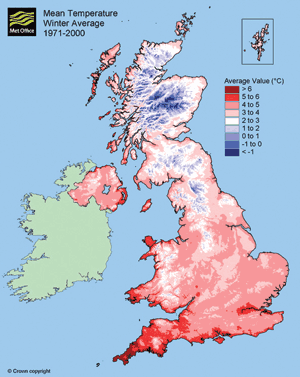Winter Tyres
Press release July 11, 2012 Energy & EnvironmentShould you buy a set?
Every winter there seems to be a hype about winter tyres, but what I really want to know is do they make that much of a difference and is it worth buying a set?
As the vehicles on our roads today become packed with new technology, which has advanced over the years, tyres have done the same to cope with heavier, faster cars with more advanced breaking systems.
Although the UK weather is not as extreme as other countries we do have cases of bad weather and on average, we have many cold days, with a surprising number of them with ice and snow. Winter tyres are designed to work to their full potential in temperatures below 7 degrees centigrade. Looking back over the last couple of winters it was easy to see and feel that temperatures are often much lower than this for the majority of this season.
This map shows the average winter temperatures in Britain between 1971 and 2000. Most of the country has an average temperature of less than 7 degrees (the blue, white and pink areas on the chart) for the December to February winter period. The Met Office reports that most of the country has a minimum temperature below 3 degrees C. In fact, most of the country has ground frost for 40 out of the 90 days of winter - with first frost falling in Aberdeen in Mid-October down to Southampton by mid-November.
Manufactures and car garages have completed a number of tests to see whether winter tyres do make a difference. They claim that the winter tyres can stop up to a bus length shorter than normal tyres can in bad weather.
It has been said and proved that winter tyres:
- Enhance performance & Grip – the technology in winter tyres means the compound does not freeze like summer tyres, so will grip the road better below 7°C.
- Allow greater control and safety – the tread design in a winter tyre is specifically created to offer better grip and traction in the snow.
- Lower speed rating – cold weather tyres have a lower speed rating than a summer tyre due to the compound they are made from. Please be aware that you’re driving will not be compromised as even a H rated tyre has a maximum speed of 131mph
Subjects
Energy & Environment

 Follow
Follow